Abstract
This paper introduces a novel application of genetic algorithms for evolving optimal addition-subtraction sequences that allow one to perform pre- computations necessary in the window-based modular exponentiation methods. When the window size is large, the pre-processing step becomes very expensive. Evolved addition/addition-subtraction sequences are of minimal size so they allow one to perform exponentiation with a minimal number of multiplication and/or divisions and hence implementing efficiently the exponentiation operation.
Access this chapter
Tax calculation will be finalised at checkout
Purchases are for personal use only
Preview
Unable to display preview. Download preview PDF.
References
Begeron, R., Berstel, J., Brlek, S., Duboc, C.: Addition chains using continued fractions. Journal of Algorithms 10, 403–412 (1989)
De Jong, K., Spears, W.M.: An analysis of the interacting roles of the population size and crossover type in genetic algorithms. In: Parallel problem solving from nature, pp. 38–47. Springer, Heidelberg (1990)
De Jong, K., Spears, W.M.: Using genetic algorithms to solve NP-complete problems. In: Proceedings of the Third International Conference on Genetic Algorithms, pp. 124–132. Morgan Kaufmann, San Francisco (1989)
Erdös, P.: Remarks on number theory III: On addition chain. Acta Arithmetica, 77–81 (1960)
Haupt, R.L., Haupt, S.E.: Practical genetic algorithms. John Wiley and Sons, New York (1998)
Knuth, D.E.: The Art of Programming: Seminumerical Algorithms, 2nd edn., vol. 2. Addison_Wesley, Reading (1981)
Koç, Ç.K., High-speed, R.S.A.: Implementation, Technical report, RSA Laboratories, Redwood City, califirnia, USA (November 1994)
Kunihiro, N., Yamamoto, H.: New methods for generating short addition chain. IEICE Transactions E83-A, 60–67 (2000)
Michalewics, Z.: Genetic algorithms + data structures = evolution program, 3rd edn. Springer, USA (1996)
Menezes, A.J.: Elliptic curve public key cryptosystems. Kluwer Academic, Dordrecht (1993)
Neves, J., Rocha, M., Rodrigues, B.M., Alves, J.: Adaptive strategies and the design evolutionary applications. In: Proceedings of the Genetic and the Design of Evolutionary Computation Conference, Orlando, Florida, USA (1999)
Nedjah, N., Mourelle, L.M.: Minimal addition chains using genetic algorithms. In: Proceedings of the Fifteenth International Conference on Industrial & Engineering Applications of Artificial Intelligence & Expert Systems, Cairns, Australia. LNCS, Springer, Heidelberg (2002) (to appear)
Rivest, R.L., Shamir, A., Adleman, L.: A method for obtaining digital signature and public-key cryptosystems. Communication of ACM 21(2), 120–126 (1978)
Author information
Authors and Affiliations
Editor information
Editors and Affiliations
Rights and permissions
Copyright information
© 2003 Springer-Verlag Berlin Heidelberg
About this paper
Cite this paper
Nedjah, N., de Macedo Mourelle, L. (2003). Minimal Addition-Subtraction Sequences for Efficient Pre-processing in Large Window-Based Modular Exponentiation Using Genetic Algorithms. In: Liu, J., Cheung, Ym., Yin, H. (eds) Intelligent Data Engineering and Automated Learning. IDEAL 2003. Lecture Notes in Computer Science, vol 2690. Springer, Berlin, Heidelberg. https://doi.org/10.1007/978-3-540-45080-1_43
Download citation
DOI: https://doi.org/10.1007/978-3-540-45080-1_43
Publisher Name: Springer, Berlin, Heidelberg
Print ISBN: 978-3-540-40550-4
Online ISBN: 978-3-540-45080-1
eBook Packages: Springer Book Archive

